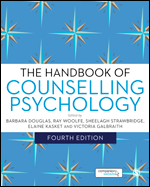The Handbook of Counselling Psychology
Fourth Edition
Barbara Douglas
Sheelagh Strawbridge - Independent Practice
Ray Woolfe - Private Practice
Victoria Galbraith
Elaine Kasket
Barbara Douglas
Sheelagh Strawbridge - Independent Practice
Ray Woolfe - Private Practice
Victoria Galbraith
Elaine Kasket
696 pages
| February, 2016
| SAGE Publications Ltd
Instant Access!
eBook
ISBN: 9781473966208
Hardcover
ISBN: 9781446276310
$197.00
Paperback
ISBN: 9781446276327
$80.00
Instant Access!
eBook
ISBN: 9781473966208
The new Fourth Edition provides the most comprehensive guide to the field of counselling psychology, exploring a range of theories and philosophical underpinnings, practice approaches and contexts, and professional issues. Thoroughly updated to reflect current issues and debates, this is the ultimate companion for your journey through counselling psychology training and into the workplace.
Special attention has been paid to the topic of research, both as a theme throughout the book and through four new chapters, covering the use, carry out, and publication of research at different stages of training and practice. The Handbook of Counselling Psychology is the essential textbook for students and practitioners in the field of counselling psychology and allied health professions, at all stages of their career and across a range of settings, both in the UK and internationally.
Special attention has been paid to the topic of research, both as a theme throughout the book and through four new chapters, covering the use, carry out, and publication of research at different stages of training and practice. The Handbook of Counselling Psychology is the essential textbook for students and practitioners in the field of counselling psychology and allied health professions, at all stages of their career and across a range of settings, both in the UK and internationally.
Available formats
ISBN: 9781473966208
eBook
Suggested Retail Price: $40.00
Bookstore Price: $32.00
ISBN: 9781473966208
eBook
Suggested Retail Price: $45.00
Bookstore Price: $36.00
ISBN: 9781473966208
eBook
Suggested Retail Price: $50.00
Bookstore Price: $40.00
ISBN: 9781473966208
eBook
Suggested Retail Price: $72.00
Bookstore Price: $57.60
ISBN: 9781446276310
Hardcover
Suggested Retail Price: $197.00
Bookstore Price: $157.60
ISBN: 9781446276327
Paperback
Suggested Retail Price: $80.00
Bookstore Price: $64.00
See what’s new to this edition by selecting the Features tab on this page. Should you need additional information or have questions regarding the HEOA information provided for this title, including what is new to this edition, please email sageheoa@sagepub.com. Please include your name, contact information, and the name of the title for which you would like more information. For information on the HEOA, please go to http://ed.gov/policy/highered/leg/hea08/index.html.
For assistance with your order: Please email us at textsales@sagepub.com or connect with your SAGE representative.
SAGE
2455 Teller Road
Thousand Oaks, CA 91320
www.sagepub.com
Section I: Situating Counselling Psychology
Chapter 1: Mapping the world of helping: the place of counselling psychology
Chapter 2: Science, craft and professional values
Section II: Setting Out on the Journey
Chapter 3: Designing your life map
Chapter 4: Becoming a reflective practitioner
Chapter 5: Engaging with academia and training programmes
Chapter 6: Entering clinical placements
Chapter 7: Becoming a supervisee
Chapter 8: Engaging with research
Section III: Finding Your Way
Chapter 9: Conceptualising in client work
Chapter 10: Diagnosis and formulation in medical contexts
Chapter 11: Forming a relationship: a phenomenological encounter
Chapter 12: Working with difference and diversity
Chapter 13: Developing self-care and resilience
Chapter 14: Carrying out research
Chapter 15: Towards ethical maturity in counselling psychology
Chapter 16: The interface between psychopharmacological and psychotherapeutic approaches
Section IV: Encountering the Landscapes
Chapter 17: Person-centred therapy in the twenty-first century: growth and actualization
Chapter 18: The evolving world of cognitive and mindfulness-based interventions
Chapter 19: Psychodynamic interpersonal model - a perfect fit for Counselling Psychology?
Chapter 20: The Practice of therapeutic letter writing in narrative therapy
Chapter 21: Neuropsychology and counselling psychology
Chapter 22: Community psychology and the counselling psychologist
Chapter 23: Psychological practice in a time of environmental crisis: counselling psychology and ecopsychology
Section V: Different Territories
Chapter 24: Counselling psychology and its international dimensions
Chapter 25: Therapeutic work with children
Chapter 26: Counselling psychology in educational settings
Chapter 27: Counselling psychology in organizations: from problem fixing to emergence and growth
Chapter 28: Working as a counselling psychologist in forensic contexts
Chapter 29: Journeying through physical health
Chapter 30: Working as a counselling psychologist in primary care
Chapter 31: The role of counselling psychology in secondary adult mental health care
Chapter 32: Research: from consumer to producer
Section VI: Becoming a Guide
Chapter 33: The transition from trainee to qualified counselling psychologist
Chapter 34: Leading and managing
Chapter 35: Becoming a supervisor
Chapter 36: Becoming a trainer
Chapter 37: Becoming an entrepreneur – practitioner
Chapter 38: Researching across the career span
NEW TO THIS EDITION:
- Chapters on: Person-Centered Therapy; Mindfulness; Neuroscience; Engaging with and Carrying out Research; Reflective Practice; International Dimensions; and Ecopsychology
- A companion website offering hours of video and audio (including conversations with counselling psychology practitioners and trainees), articles, exercises, and case studies
- Other new features include: Further Reading, "Day in the Life of" dialogues with practitioners; Reflective Exercises, and Discussion Points, and new case studies

